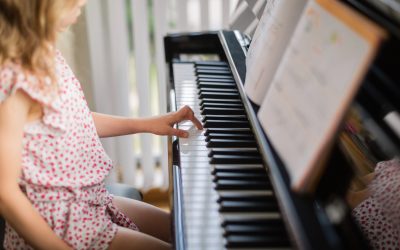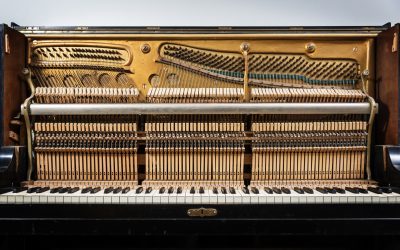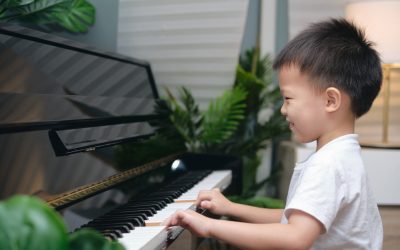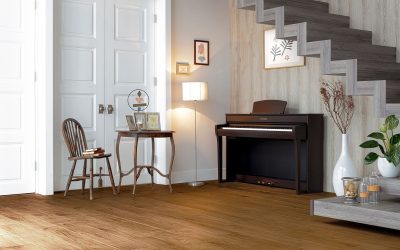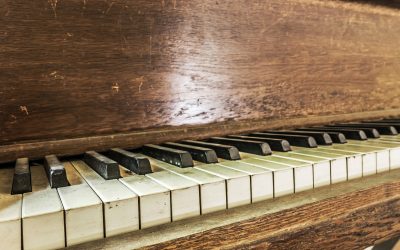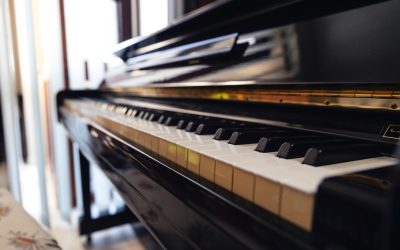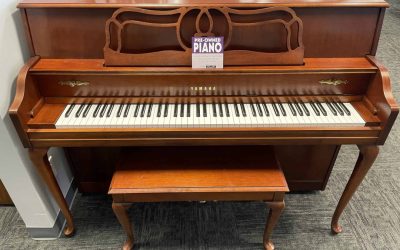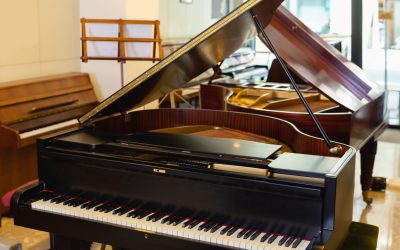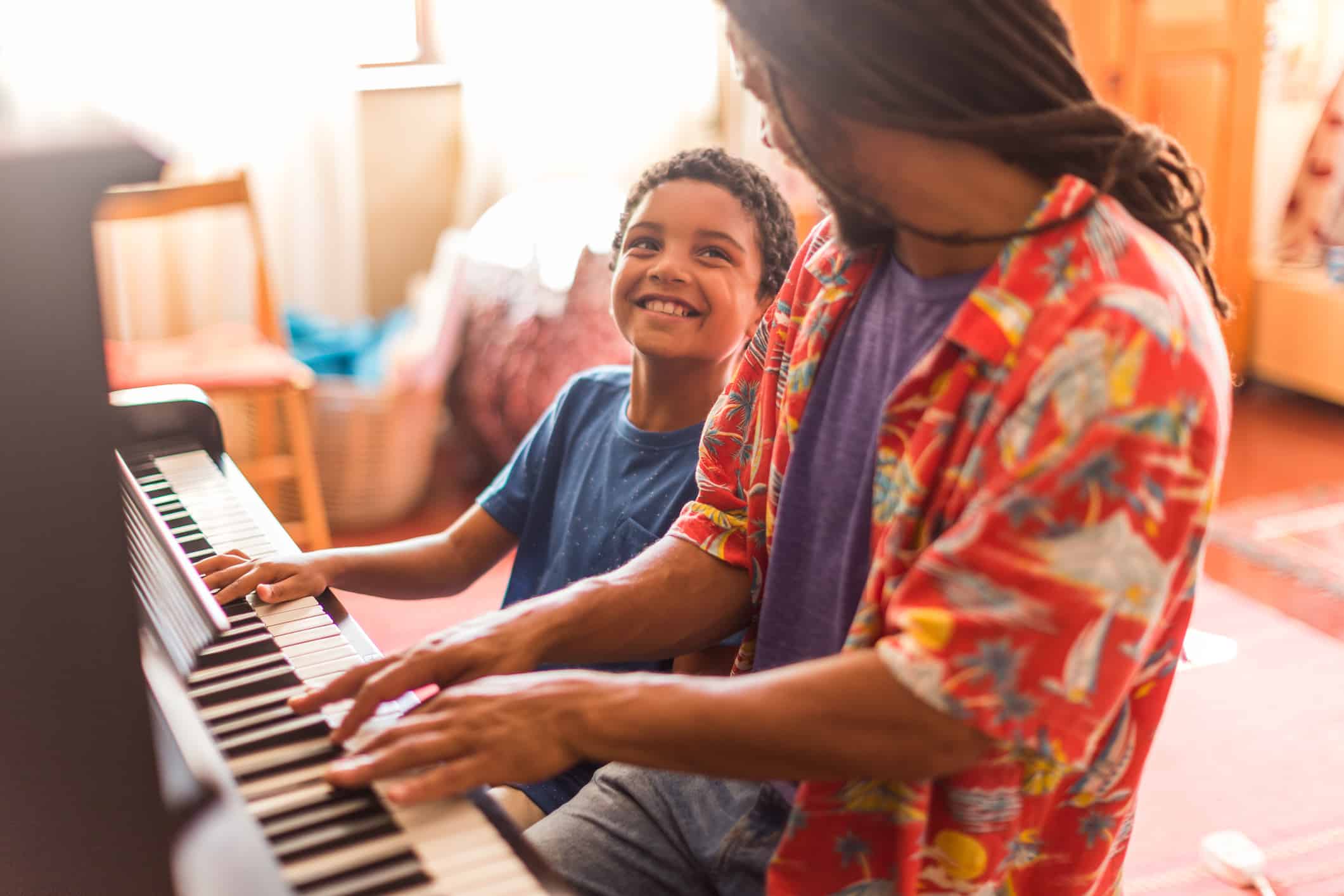
Every once in a while we encounter someone who would love to buy a new piano for their home–but is worried it won’t get played often enough to make the purchase worth it. In this article, we discuss some of our favorite tips for encouraging piano playing in your home.
9 Ideas for Encouraging Piano Playing in Your Home
There are several benefits to just having a piano in your home for children, but there are also several ways to encourage piano playing in your household.
1. Lead by Example
One of the easiest ways to encourage piano playing in your home is to lead by example. The more you sit down and play the piano, (even if it’s playing the one song you learned in elementary school ages ago), the more likely others are to sit down and play. If you’re worried about your own commitment to playing, set a schedule with yourself to play for 15-20 minutes once or twice a week at consistent times when you’re almost always available. It’s easier to stick with a commitment on a schedule than to wait for the motivation to show up–and chances are it will become a new favorite part of your routine!
2. Make it Accessible
If your piano is in a room that isn’t used very frequently or if the instrument is situated in a way that requires extra effort to get to, it’s less likely to be used. If you can, make sure your piano is put in one of the main areas of the home and that the barriers to playing are few or none. For instance, many families choose to place their piano in their main living area. If they have purchased a grand piano, they’ll position the seat outward and open the piano lid to the main area of the room so it’s easy to sit down and play.
3. Piano Lessons
Another easy option is to take–or have your children take–piano lessons. After all, daily practice ensures the piano will be played, and strengthening piano-playing skills means you’re more likely to sit down and play for pure enjoyment.
4. Consider a Player Piano
Many clients choose to purchase a player piano for specifically this reason. A player piano has the ability to play piano music on its own without requiring a live player. This music can be simple or intricate depending on the type of player, and sometimes even includes the keys and pedals moving autonomously. If you’re interested in learning more about player pianos, please reach out.
5. Embrace Exploration
This is a tough one to encourage all the time, but another way to ensure your piano is used frequently in your home is to embrace exploration–even if that means toddlers playing the same four keys that their little hands can reach over and over…and over. The idea behind this strategy is to make the piano accessible and a “yes zone” for play. It will become more commonplace for your child to play the piano if they aren’t chastised often and early for doing so, making them more likely to want to sit down, explore, and learn as they grow older.
6. Kid-Appropriate Engagement
Encouraging your children to engage with the piano can be a fun way to ensure it’s used frequently in the household. Teach your child a simple duet that you can play with them, have “dance parties” where you play their favorite songs (or have the player piano play the songs), play their favorite nursery rhymes or songs so they can sing along, or teach primary music theory by playing loudly and softly or high and low and asking your child the difference between what they’re hearing.
7. Accessible Sheet Music
Whether the piano players in your household are advanced or just beginning, it can be a good idea to keep sheet music and music books for their specific levels accessible, such as in the piano bench or a bookshelf near the piano. Make it visible, when possible, so it can catch your family’s eye when they walk by, and consider rotating a piece of music or a music book on the music stand, open and ready to play, to encourage the occasional passer-by to sit down and give the music a try.
8. Start New Traditions
Another way to encourage piano playing in your home is to include it as part of your family’s traditions. Maybe someone in your family can play the “happy birthday” song when the cake comes out on birthdays, carols on Christmas, church hymns on Sundays or holidays, or parade marches on the 4th of July. Get creative, such as playing John Schmidt’s “Dumb Song” to kick off Saturday morning dance parties–the sillier traditions are the ones your children will remember most when they’re older.
9. Consider a Digital Piano
Many families consider buying a digital piano over an acoustic piano, especially if they have children in the household. Digital pianos come with a great number of learning tools, such as play-by-light programs, as well as different instrument sounds, backup musicians, recording capabilities, karaoke programs, device integration, and more. Children are so technologically inclined these days, many parents find that they take to the technology of a digital piano quickly and happily.
Final Thoughts
In almost all cases, we find that clients are even happier than they expected to bring a piano into their homes. If you have a love of music as most people do, the impulse to sit down and play will likely come naturally.
You may also be interested in...
Encouraging Yourself to Play Piano More as an Adult
Playing the piano is rewarding, not only for the relaxation it provides, but also for the sense of accomplishment, confidence, and stress release if offers. However, for many adults, it can feel frivolous to take the time to play the piano. With so many other...
How to Keep Your Child Motivated to Practice the Piano
You picked the perfect piano, hired a highly-rated piano teacher, and bought your child a stack of books to learn how to play the piano—but one thing’s missing: their motivation to practice. Even if a child is super excited to learn to play the piano, there are some...
Top Health Benefits of Playing the Piano
There are many reasons people choose to play the piano—for pleasure, skill development, stress relief, and more. In this article, we explore the health and wellness benefits of playing the piano. How Playing the Piano Supports Health & Wellness Playing the piano...
Upright vs. Grand Pianos: Differences & Benefits
The choice between an upright or grand piano usually comes down to size, price, aesthetic, or all three. However, for those piano buyers who have wiggle room (literally and figuratively) in choosing a piano, the conversation about the difference between an upright and...
Yamaha U Series Upright Pianos
Yamaha is a world-renowned name in pianos because of their quality, reliability, and beauty. With a rich history of piano craftsmanship beginning in 1887, the heritage of Yamaha has made it one of the most respected names in the industry. About Yamaha’s U Series...
Yamaha Clavinova Digital Pianos: A Complete Guide
The Yamaha Clavinova is a world-renowned digital piano manufactured to emulate the touch, feel, and expression of an acoustic grand piano while offering a wide range of additional features, technology, and capabilities. In this article, we answer some of the most...
Ideas for Planning an Engaging Piano Recital
Piano recitals, especially for younger students, often have a reputation of being a little blasé. However, with the right preparation and innovation, a piano recital can be a captivating, elevated experience for its attendees. 10 Tips for a More Engaging Piano Recital...
Understanding the Difference Between a Keyboard and a Digital Piano
If you're new to the world of music or considering an upgrade from your current instrument, you might be wondering about the differences between a keyboard and a digital piano. While both instruments share similarities, they also have distinct characteristics that...
How Digital Pianos Can Enhance Music Education
For new or experienced piano students, a digital piano can be an exceptional tool for enhancing music education. This is especially true for new or young piano students. In our blog “Best Pianos for Beginners,” we further discuss this fact as we discuss our choice of...
How to Clean and Maintain Your Yamaha Clavinova
While Yamaha Clavinova digital pianos require less maintenance than digital pianos as they don’t require annual tuning, regular cleaning and maintenance can help extend the life and performance of a Clavinova. In this step-by-step guide, we walk you through the...
About Free Pianos: What to Know Before Accepting a Free Piano
If you are in the market for a pre-owned piano, you may have seen many classified ads for pianos people are giving away for free. But why are there so many free pianos and should you be wary of accepting a free piano from a friend, family member, or neighbor? Why Are...
Is Having a Piano in the Home Good for Kids?
We already know that there are several benefits to kids for learning to play the piano, but what about just having a piano in the home? For children who are still too young to play the piano or for those who have chosen to pursue other passions, there are still...
How to Spot a Quality Piano: A Beginner’s Guide
If you’re looking to buy a piano, whether new or used, you may be wondering how to ensure your purchase is of good quality. After all, purchasing a piano can be a significant investment, depending on whether you’re purchasing a beginner piano or an advanced piano, and...
Used Yamaha Pianos: What to Know
Used Yamaha pianos are among the fastest-selling brands of used pianos. Because of their material and manufacturing quality as well as global brand recognition, Yamaha pianos are preferred by individuals looking for a used piano they can rely on. Yamaha Pianos Their...
Why Buy a Used Piano?
If you’re interested in purchasing a new piano, you may be considering the benefits of a used piano compared to a new piano. Used pianos can be a tricky purchase if you don’t know what you’re looking for, especially if you’re buying from a private party that may not...

